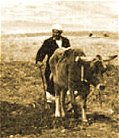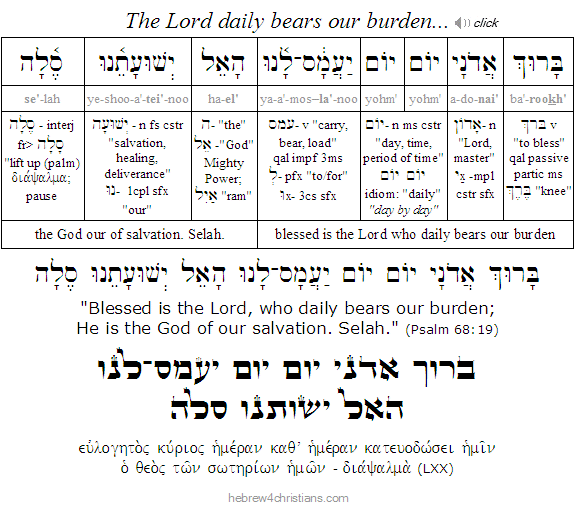Yom Yom Ya'amos-Lanu
The Blessing and Burden of Grace
"Blessed is the Lord, who daily bears our burden;
He is the God of our salvation. Selah. - Psalm 68:19(20h)


IN THIS VERSE of blessing, the phrase yom yom ya'amos-lanu can be translated as "who daily carries our burden for us." Just as a humble pack animal might bear heavy sacks of grain for its owner, or a beast of burden might suffer the drag of a plow in a field, so God, in His infinite compassion, bears our burden in order to lift us up, and relieves our distress so that we can walk uprightly before Him.
Learn Hebrew
On the other hand, yom yom ya'amos-lanu can also be translated as "who daily burdens us." Using the same analogy of a pack animal, every day God gives us burdens to bear and trains the direction of our plows. We are called to love and serve others, and that means performing avodah (work) by providing care, giving attention, and participating in the "repair of the world" (tikkun olam) as co-laborers with the God of our Salvation.
Like the paradoxical statement, "work out your own salvation with fear and trembling, for it is God who works in you both to will and to work for his good pleasure" (Phil 2:12-13), so this verse pictures us yoked together with the Lord in the process of our salvation. God becomes our "beast of burden" in order to free us up to become burden-bearers for others.

"Come to me, all you who labor and are heavy laden, and I will give you rest," Jesus said. "Take up my yoke upon you and learn from me, because I am gentle and humble in heart, and ye shall find rest to your souls. For my yoke is easy, and my burden is light" (Matt 11:28-30).
The yoke is not the burden, but is a means of bearing the burden. The burden of a life alienated from God in this fallen world is indeed heavy and difficult to bear, but the grace of God is given when we are yoked to Jesus and share His burden to love and care for others.
Jesus' Hebrew name is Yeshua, which comes from the same root (yasha) as yeshuateinu in this verse. Ha'El Yeshuateinu means "the God of our yeshuah (salvation)," and points to the salvation given to us through Jesus as our Sin-Bearer before the Father.
Every day Jesus carries the burden of our sin so that we might bear the burden of His love for others. Barukh shem kevodo l'olam: Blessed be His glorious Name forever.
Hebrew Lesson:

- Psalm 68:19 Hebrew reading (mp3)
- Psalm 68:19 Hebrew lesson (pdf)
Hebrew for Christians
Copyright © John J. Parsons
All rights reserved.